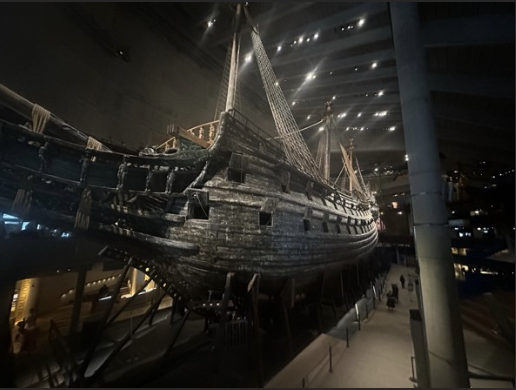Sometimes leadership lessons emerge from the strangest places.
One of the premier museums in Stockholm, Sweden is the Vasa Museum. The Vasa was a ship commissioned by the King Gustav II Adolph in 1625. It was intended to be a warship with significant firepower to protect and expand the Swedish empire. When the king ascended to the throne, Sweden was at war with Russia, Denmark, and Poland-Lithuania.
Unfortunately, on its maiden voyage, the Vasa got about 1,200 meters into the Stockholm Harbor and was hit by a light gust of wind. This caused it to heel over on its side, and the ship started taking on water through its gun portals. It sank and 53 people died.
An epic failure. But why?
There were many reasons, but primary among them was that the King continued to change his orders for what kind of ship was to be built, including adding a second gun deck. He also insisted on extensive (and heavy) carvings depicting various themes, all of which increased the center of gravity of the ship making it increasingly unstable.
Inside the Vasa Museum, you can see the ship and learn about its story. Because of the low salinity in the Baltic Sea and Stockholm harbor, the ship was remarkably well-preserved and was raised from the bottom of the harbor in 1961. The Swedes joke it is the biggest celebration of failure, ever.
I think the museum is a monument to the limits of expertise and the huge upsides to an open mind and an attitude of continuous improvement. When King Gustav insisted on having his way despite not being a shipbuilder, he quite literally sunk the project.
If this was an anomaly, that would be one thing, but this mindset is indicative of the most prevalent stage of adult vertical development with about 40% of adults having a center of gravity in the stage called Specializing.
In the Specializing (or Expert) stage, I am identified with what I know. I’m focused on acquiring subject matter expertise and using it to solve problems. I believe that I’m right, or that the experts I reference are right. High quality work products are important. “If you would just do what I say, we’d be fine.”
There is a lot of benefit to this worldview. We need people who are deep experts in their fields and who can solve difficult problems. But like the Swedish king demonstrates, this Specializing mindset has limits, especially in leadership. When I have all the answers, I have trouble collaborating with others, let alone leading them. I’m more focused on being right than I am on getting results or having an impact. This can be such a liability that I cause a negative impact, like the king did.
Adam Grant, author and professor, puts a fine point on it:
“In our daily lives, too many of us favor the comfort of conviction over the discomfort of doubt. We listen to opinions that make us feel good, instead of ideas that make us think hard. We see disagreement as a threat to our egos, rather than an opportunity to learn. We surround ourselves with people who agree with our conclusions, when we should be gravitating toward those who challenge our thought process. The result is that our beliefs get brittle long before our bones. We think too much like preachers defending our sacred beliefs, prosecutors proving the other side wrong, and politicians campaigning for approval – and too little like scientists searching for truth. Intelligence is no cure, and it can even be a curse: being good at thinking can make us worse at rethinking. The brighter we are, the blinder to our own limitations we can become.”
The Vasa Museum is a delight, and even though it highlights the limits of expertise, it is also a celebration of learning and innovation as efforts to preserve and learn from the Vasa are underway and shared in the museum exhibits.
In that way the Vasa offers us the possibility of our own evolution. Can we recognize when we should lead with our expertise? When should we lead with curiosity? When can we operate independently? When is collaboration critical? When does ‘being right’ serve, and when does a focus on the impact or the outcome serve better?
Jessica
Founder & CEO
The Sparks Group



